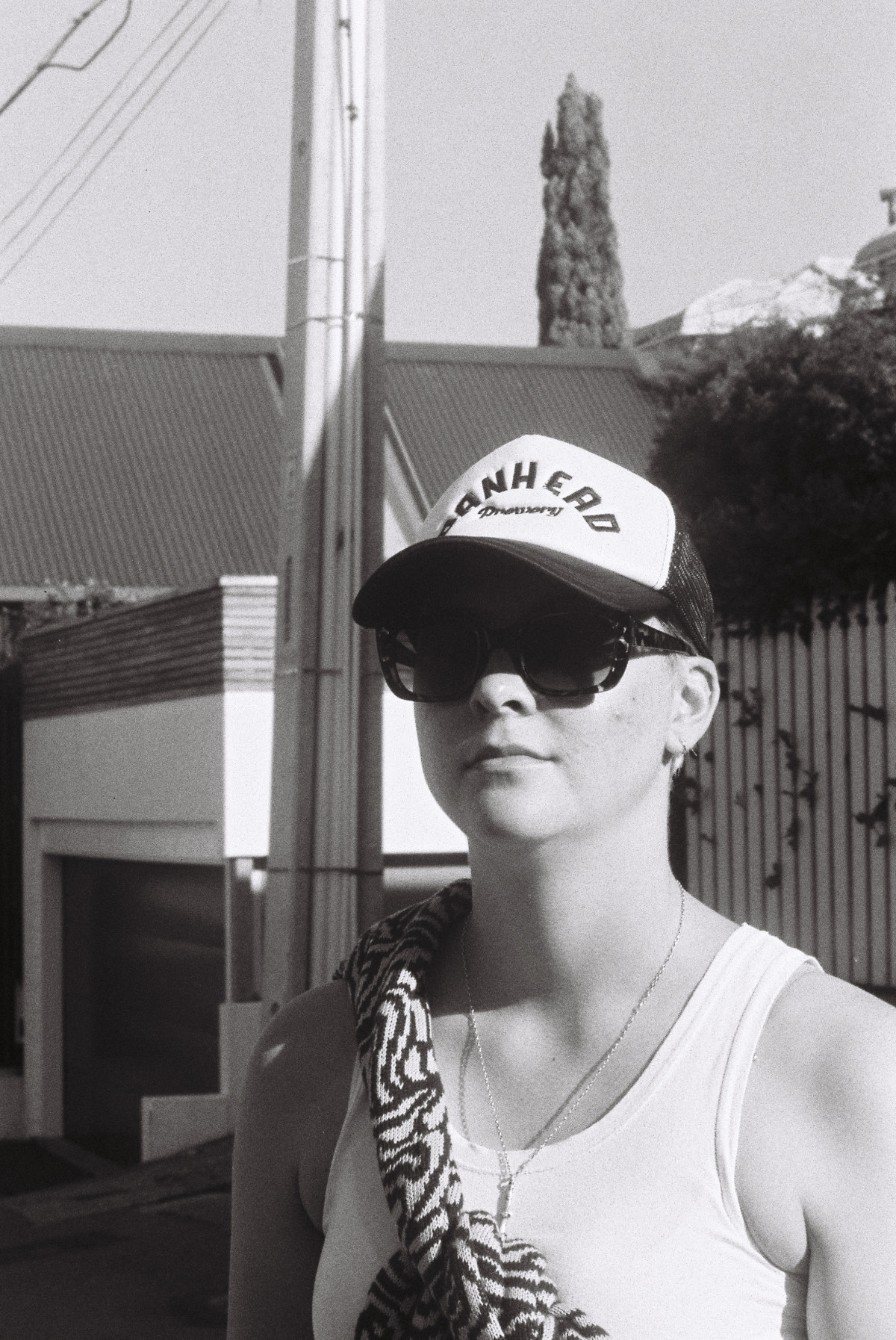Lying in bed at night, most people will hear the wind blowing or the quiet rustling of trees.
But Coco Sargent hears a constant buzzing in her ears that sounds like a vacuum cleaner is running non-stop in the room next to her.
She hears that whining machine noise constantly, but it’s even louder when the world gets quiet at night.

Coco Sargent says there needs to be more awareness of tinnitus so young people can protect their ears before it's too late. Photo credit: Tom Lichtnecker
“I have to listen to a sleep podcast otherwise the whining keeps me up and I can’t sleep,” she says.
“Sometimes my ears will pop and I can’t hear anything for a little bit. Then my hearing slowly comes back muffled like after you get off a plane.”
That buzzing noise is tinnitus - an incurable condition that can be caused by the loss of hearing sensitivity when we are exposed to excessively loud noise for long periods of time.
A person with tinnitus hears a ringing or humming noise even when there is no external noise around. It affects about 15% of the population.
What’s up with the ringing sound in my ears after a concert?
University of Auckland senior science lecturer Dr David Welch says tinnitus is a bit like phantom pain - where a person who has lost a limb still feels itching or tingling in that area.

Dr David Welch says people need to look after their hearing because the sensory cells in our ears never come back once they die. Photo: Supplied.
“If someone loses their arm in a car crash, the part of your brain that would normally be responding to the neurons, the sensory cells in the skin and muscles of your arm, are still there.
“But it's not getting any messages from the arm because the arm is gone.”
“So those neurons in your brain become hyperactive by themselves and fire off sensations,” Welch says.
“That’s why people who've lost their limbs can feel itching or tingling or even pain in the missing limb.”
“We believe that tinnitus is the same thing but for your ear,” he says.
Welch says if you lose sensory cells in your ear as a result of excessive noise exposure like going to a bunch of loud concerts or blasting music in your headphones, then the neurons in your brain that would normally be responding to those sounds are getting no input.
This means they can become active by themselves and start firing off and we experience this as if there was sound, even when there isn’t.
Sensory cells in our ears never come back once they are damaged
Welch says each person is born with about 16,000 sensory cells in their ears.
Over time these cells get chipped away and they can’t repair themselves or come back to life - so once they are gone, they are gone forever.
“When we lose 10 or 100 of them, we can’t notice the difference. But if you keep losing them in the tens of hundreds because you listen to really loud music or work in a noisy environment - you’ll start to notice a constant ringing or experience hearing loss.”
Welch says these signs of tinnitus can either be permanent if a lot of sensory cells have died.
Or they can be temporary because the cells in your ears have been stunned by noise.
“Have you ever walked out of a concert and the world seems quiet and muffled? That’s because the cells in your ears are highly adaptive and they have turned themselves down and become less sensitive to protect themselves - so we hear things more quietly.”
This is also why some people hear a ringing noise in their ears after concerts but it goes away once the ears have adjusted back.
Welch says if the ringing in your ears after a concert hangs around, this is a sign you have permanently damaged your sensory cells.
How can I protect my ears?
Welch says wearing well-fitting earplugs is one of the best (and only) protections on offer - unless you reduce how much you are exposed to loud noise altogether.
“I know people have tried using rolled-up bits of toilet paper or even cigarette butts to protect their ears. But these don’t work very well because you’ve got to have them deep in your ear and have no gaps that sound can come through.”
“Even if there is a tiny gap, the sound will find a way through and cause damage so you need to have purpose-built earplugs,” Welch says.
Sets earplugs were designed to protect your ears at concerts
Grace Ko and her friend Emily Janus started their hearing protection earplug business Sets because they were sick of trying to stuff toilet paper in their ears at gigs.
“The ringing in our ears after clubbing would give us anxiety for a whole day,” Grace says.
“Lots of our friends who are DJs have suffered from tinnitus so we'd always go to the bathrooms and put toilet paper in our ears and we noticed other people doing the same.”
Grace says tinnitus and hearing loss from listening to loud music has always been a problem, but not many people are aware of it - or seem to really care.
“People equate listening to music at full volume, as enjoying the ‘full experience’. So I think there's definitely a stigma around hearing protection and people not wanting to dull down the music.”
Grace and Emily created their own earplugs that don’t muffle the sound of the music - they lower music by 23 decibels.
‘“The music is still crisp and clear, not like having foam earplugs in. It just feels like you’ve turned the sound down a couple of notches.”
What I wish I could tell my younger self
Looking back, Coco says she would tell her younger self not to stand right by the speakers at gigs.
“That’s a terrible idea. Why are you there all night right in front of the speakers yelling at your friends? Just move away,” she says.
“I just didn’t realise what the consequence of this was, because I didn’t even know tinnitus was a thing until some DJ friends were talking about it. I thought everyone had the constant humming noise, I was shocked to find out that it wasn’t a normal thing.
“There needs to be more awareness so that people know how to protect themselves before it’s too late.”
To get in touch with the author of this article, email zoe@renews.co.nz
Top image: Group of people dancing, elevated view - stock photo. Source: Getty images.
More stories:
The pill could have 92% less hormones and still work, study finds
But Aotearoa could probably benefit from other moves in the birth control space.
Opinion: Why I am still a Christian
When I was a kid, I never doubted. Recently, I have found myself far more comfortable with it.
How Australia’s vape crackdown created a huge black market
And what New Zealand can learn from it.